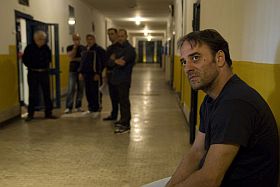


cph:dox Recommendations

The 10th Copenhagen documentary film festival runs until sunday. Filmkommentaren will review some of the films and recommend Copenhageners and festival guests, what should be watched.
A must of course is Oppenheimer’s ”The Act of Killing”. The film still has 4 screenings at the festival (two of the 159 mins. version and two of the 115 mins. version). The cinema distribution (the 115 mins. version) kicks off on the 7th (wednesday) through the brilliant DoxBio initiative. Equally you should not miss the Brothers Taviani and their ”Caesar Must Die”, Golden Bear in Berlin. Where ”The Act of Killing” is a grandiose Shakespearean story, ”Caesar Must Die” (photo) is literally the mise-en-scène of the play ”Julius Caesar”, magnificently performed by inmates in a prison in Rome. The word magnificent is the one and only to be used about the cinematography of a third film in the main competition of cph:dox, the one that did not win at DOK Leipzig, ”The Last Station” by Chilean Catalina Vergara and Christian Soto, the latter responsible for the camera work, which brings dignity and love to the old people at the nursery home, the last station.
… and if you want to experience how light and playful filmmaking (also) can be, watch Scottish Mark Cousins wee film, ”What is this Film called Love”, shot on a mobile phone in Mexico City during three days where the director had no agenda, did some push-ups in his hotel room but ended up going around in the city communicating with a photo of Eisenstein, who never finished his Mexico-film. 18 mins. of pure pleasure!
And here is quote from the review made of the new film by Timo Novotny, ”Trains of Thoughts”: Novotny is an aesthete and his fascination of lines and forms is brilliantly conveyed through the montage of images, words and the music of the Sofa Surfers. Music that flows the whole way through and is synergetic with the image in pulse and rythm, contrary to the mainstream use of music in documentaries today, where the music is poured on like sugar to hide lack of energy in the sequences.
And another quote from the film of Namir Abdel Messeeh, ”The Virgin, the Copts and Me”, a doc comedy: This storytelling tool, including the making of the film in the narrative, a meta plan, works in this case as the film is about a young French filmmaker who, after 15 years, goes back to his Egyptian coptic roots in a village, against the will of the mother, who in the beginning says that ”no members of the family (should be) in the film”. But the help of mum gets the film to be finished, the family members all end up in the film, which adds to the film’s light-hearted entertaining qualities at the same time as it gives a beautiful hommage to people far away from Tahrir Square, in a small village where someone once saw the apparation of Virgin Mary.